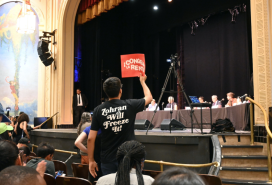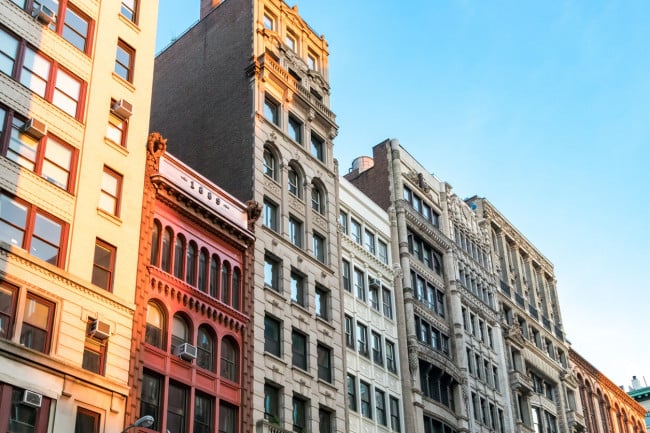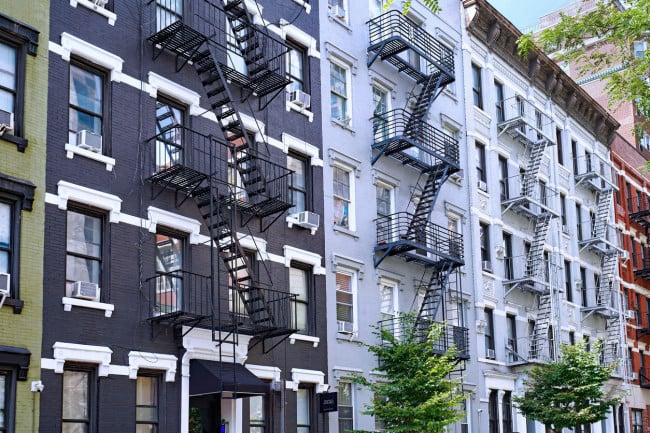Want to buy an investment apartment to rent out? Here's what you need to know
- Studios and smaller one or two bedrooms are usually the easiest to rent out
- Avoid co-op buildings if your goal is to rent the apartment out for the long term
- Buying a place with all cash will maximize the return on your investment

This one bedroom is listed for $425,000 at 431 West 54th St., a small co-op building that allows subletting.
Most people can't afford to buy a New York City condo or co-op as an investment property, but for those who can swing it—and can handle the responsibilities of being a landlord, such as vetting potential tenants and dealing with midnight plumbing emergencies—it can be a good way to make some extra cash each month, create a hedge against inflation, and hopefully turn a profit when you sell.
The NYC rental market is typically competitive—there are always way more renters than buyers here. And many potential buyers find themselves renting now. They are holding off making a move amid still-high mortgage rates and are willing to pay more for rentals.
That's one reason brokers say it is a great time to be a real estate investor.
But beware: The 2019 changes to New York State's rent laws transformed renting for both renters and landlords, meaning you'll need to weigh the cost of ownership with more caution. In addition, the recently passed Good Cause eviction legislation now protects some market-rate renters from big rent hikes.
Common FAQs about buying a rental property
In this edition of Brick Underground's Buy Curious, Mary Barbrack, a broker at Compass, and Erin Wheelock, an agent at Keller Williams NYC, explained how to buy an apartment to rent out, including where you should look, what apartment size to consider, and how much you can expect to take in each month.
The proposition:
I want to buy a single apartment as an investment property. Where should I look? What type of unit is best? And what kind of return on my investment can I get?
The reality:
"It is still an amazing time for buyers, especially cash buyers who are looking to build their portfolios. We know the market is cyclical, and I believe this is an ideal time to take advantage. I look at my buyers who say they are kicking themselves for not buying in 2009. Well, now is their time, or they will kick themselves again in the future," Wheelock said.
Mortgage rates have dipped slightly; however, the combination of high prices and high financing costs is keeping some buyers out of the sales market—and driving rents up due to the high demand.
Wheelock said that in a few years, you should be able to refinance at a lower interest rate.
However, she emphasized cap rates (i.e., the rate of return on an investment property based on projected income) typically won't cover your mortgage in NYC and can be a reason buy with all cash. That can be a shock for people new to buying here, since capitalization rates are normally around 2 percent, and your mortgage will be (much) higher.
She advised holding the property for four, five, or six years until the value surpasses what you paid for it. "I once heard someone say, 'If you can't afford to hold, you can't afford to invest in NYC,' and I strongly agree. If you are the person who has been waiting for interest rates to go up to snag some cash deals, this is your moment," she said.
Of course, there's the risk that you will not make anything at all. Barbrack credited the tenant-friendly legal and regulatory environment with cooling interest in being a landlord.
She said several investor clients approached her team about selling, rather than becoming landlords, citing the inability to collect more than one month's security deposit (a disrespectful tenant can cause significantly more damage), as well as the hassle of being a landlord, in addition to the current legislative environment.
The best NYC neighborhoods for investment properties
"When I advise clients on where to plant their investment dollars in NYC’s rental market, it always comes back to one question: 'Who are you targeting?'" Barbrack said. "Your tenant profile dictates not only the neighborhood but also the building type, price point, and even the unit layout.
Here’s how she breaks it down:
If you’re chasing the energetic millennial and Gen Z crowd—folks who prioritize walkability, nightlife, and next-door coffee shops over square footage—look no further than the Lower East Side, and West Village, and Brooklyn Heights. "These neighborhoods thrive on 'lifestyle rent'—tenants will willingly sacrifice a spare room if it means living in the heart of the action."
For investors seeking stable, high-end tenants—often C-suite transferees with children eyeing top schools—the classics never fail: Prime Upper East Side (60s to the 80s between Fifth and Park as well as Tribeca, where loft conversions with soaring ceilings and large kitchens/living areas mirror suburban comfort within city limits, making it attractive to families used to larger footprints. "These areas command consistently strong rents and enjoy minimal vacancy—even in softer markets—because they cater to tenants for whom school district and prestige matter as much as space."
When you want ultra-modern finishes and luxe amenities, your target shifts to West Chelsea and Hudson Yards, the Financial District, Downtown Brooklyn, and Upper West Side new developments. "These projects attract tenants looking for turnkey, urban luxury," she said.
If your strategy is “buy low, earn high as the neighborhood improves,” consider Murray Hill, Kips Bay, and Midtown East. Crown Heights and Prospect Lefferts Gardens are lively Brooklyn neighborhoods where new restaurants and nightlife are driving rapid rent growth. "Early investors here may face slightly higher vacancy at first, but once word spreads, your rents can leapfrog ahead."
Bottom Line: "There is no one 'best' neighborhood, only the one that aligns with your tenant profile," Barbrack said.
If you want to hone in on other emerging areas, look for the following:
An increased investment in infrastructure, such as expanded transit options, a new school, or renovated parks; the arrival of Citi Bike stations is another clue.
New construction or numerous conversions—developers spend tons of money getting intel on where to invest, and you can capitalize on their findings.
A declining average days on market, indicating that most apartments are getting scooped up after just a few days on the market.
What's better: condos vs. co-ops?
The condo vs. co-op debate is one of NYC's more nuanced real estate considerations.
Co-ops make up about 60 percent of available apartments for sale in NYC and are typically more affordable than condos. However, as Barbrack pointed out, co-op buildings are tricky for investors because they typically impose strict sublet restrictions.
She explained that in most buildings, you must live in your unit for the first two years before you’re allowed to rent it out—and even then, you can often only sublet for two out of every five years, meaning you must occupy the apartment the rest of the time. What’s more, co-op boards have the power to change these rules at their discretion, even retroactively, leaving investors vulnerable to sudden policy shifts. On top of that, many co-ops levy a substantial sublet fee—often as high as 50 percent of your monthly maintenance charge—whenever you rent your unit.
"These fees can drastically erode your rental income and make it challenging to achieve a healthy return on investment," she said.
Furthermore, purchasing in a co-op typically involves a lengthy approval process, which requires financial disclosures, character references, and a personal interview with the board. So even if they did allow you to rent the place out immediately after purchase, you might not want to deal with all of that—especially when you don't even plan on living there.
"By contrast, condominiums are a win for investors, generally offering far greater flexibility for landlords," Barbrack said, adding that in most condo buildings, you have the right to sublet from day one, without any minimum living requirement or waiting period. The bylaws governing condos are also much more stable, so you face far less risk of abrupt rule changes. And while condos may charge modest move-in or move-out fees, they almost never impose ongoing sublet surcharges.
"This combination of predictable rental rights and lower fees makes condos the clear choice for investors focused on consistent cash flow and long-term stability," she said.
Usually, a listing will say whether an apartment is "investor-friendly" or allows subletting. If not, ask the listing agent.
Best unit size for an investment apartment
According to Barbrack, apartments with one or two bedrooms are typically the easiest to rent out, as prospective tenants looking for smaller units make up a larger segment of the renter population.
Larger apartments will, of course, command a higher rent, but their vacancy periods can be longer as there are fewer tenants shopping for them. That said, families are more likely to want to settle somewhere for a while, meaning they are more likely to stay for multiple years.
Some buyers prefer to purchase a few studios to rent out, rather than a single, large apartment, as a way of spreading their risk.
That's Wheelock's advice. "Luxury units are less in demand, so I now highly recommend getting a few smaller units because units that rent between $3,000 and $5,000 a month are where the most activity is," she said. For example, she listed one Manhattan apartment at $12,000, and it was bid up to $13,300; the following year, that same apartment was listed at $11,500 and ultimately rented for $10,500. "I have another unit in Brooklyn that's going through the same price issues."
Should you buy properties that aren't subject to the mansion tax?
Not necessarily, both brokers said. While the mansion tax on $1 million is $10,000, it represents only one percent of the overall purchase and should not necessarily be given more weight than other financial considerations.
And if an apartment with a mansion tax has significantly lower monthly payments, then it may be a smarter investment because it can be better to spend more money on a unit with low monthlies than the opposite, all else being equal.
There are also ways to lower your closing costs—such as buying in a new development with a tax abatement. You might even be able to convince the seller of a $1 million-plus property to drop it below the mansion tax threshold.
For more information on the upfront costs of buying a home in NYC, see "Closing costs: A guide for NYC buyers and sellers."
Can you live off the rental income?
Probably not if you're buying just a single apartment, our experts said. For most investors, it's more of a second-income opportunity. You would need a much larger portfolio of apartments to rent out or get into buying and flipping if you're looking to quit your day job.
"If you have the capital and don’t mind managing (or hiring someone to manage) a whole building, owning townhouses and small multi-families can really pay off," Barbrack said. "Just keep in mind they’re pricier to buy and need more hands-on upkeep." Although these opportunities are scarce in Manhattan, she noted that the inventory is deep in Brooklyn and Queens.
What to know about being a landlord
Speaking of rent laws, you'll want to brush up on what you're signing up for—even market-rate tenants receive numerous protections in NYC.
Under the Good Cause eviction law, which went into effect in 2024, an owner must have a good reason to evict a market-rate tenant, such as if they have broken the law or violated the lease terms. It also means that an owner has to justify rent increases above a certain threshold, pegged to inflation; for this year, that amount is 8.79 percent.
Ultimately, only you can be certain that you're ready, willing, and able to handle the headaches of being someone else's landlord. Not everybody can cope with the responsibilities.
You need to find and vet tenants, collect rent, address any issues your tenants have with the unit, and stay up-to-date on current rules and regulations applicable to the landlord-tenant relationship to ensure you're always on the right side of the law.
Before you venture into landlord territory, take time to identify what you'd do—and who you would turn to—in a slew of possible situations. What if the building's boiler breaks and there's no heat? What if the tenant discovers black mold? You'll need to take swift action to rectify anything and everything that might (make that does) come up.
Or follow our experts' advice and spend money on a property manager—which, while eating into your quantitative return, provides significant value from a qualitative standpoint.
—Earlier versions of this article contained reporting and writing by Leah Hochbaum Rosner. It was updated for 2025 by Evelyn Battaglia.
You Might Also Like






























